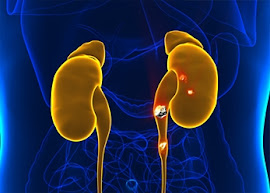Kidney Stones/Renal Calculi
By:Samsubrat
Kidney stones are common disorders that affect the urinary tract. Kidney stones are hard, pebble-like pieces of material that are formed when your urine becomes concentrated, allowing minerals to crystallize and stick together. Kidney stones usually originate in your kidney. However, they can develop anywhere in your urinary tract, which includes these parts :
- Kidneys
- Ureters
- Urinary bladder
- Urethra
Kidney stones vary in shape and size. They can be as small as grain of sand or as large as pea and some stones rarely grow larger than the size of pea. Kidney stone is considered as one among the most painful conditions. Most kidney stones pass on their own causing little or no pain but large stones may get stuck anywhere in the urinary tract and can block urine flow which is very painful. Most of the kidney stones become lodged in the narrowing sites of ureters and these sites are :
Ureteropelvic juction(UPJ)
The Urethral crossing of the iliac vessels and The Ureterovesical(UVJ)
𝗧𝘆𝗽𝗲𝘀 𝗼𝗳 𝗞𝗶𝗱𝗻𝗲𝘆 𝘀𝘁𝗼𝗻𝗲𝘀/𝗥𝗲𝗻𝗮𝗹 𝗖𝗮𝗹𝗰𝘂𝗹𝗶:
𝗖𝗮𝗹𝗰𝗶𝘂𝗺
𝗦𝘁𝗼𝗻𝗲𝘀 : these are the most common type of kidney
stones. They are often made up of calcium oxalate. However they can
be consist of calcium phosphate or maleate. Oxalate is a substance
made daily by your liver or absorbed from your diet. Some fruits and
vegetables, potato chips as well as nuts and chocolates have high
oxalate content.
𝗦𝘁𝗿𝘂𝘃𝗶𝘁𝗲 𝗦𝘁𝗼𝗻𝗲𝘀:
The cause of this type of stone is urinary tract infections (UTI) and
this stone is mostly found in females than in males. These stones can
grow quickly and can cause urinary obstruction. Treating UTI's
(underlying cause) can prevent the development of struvite stones.
𝗨𝗿𝗶𝗰 𝗮𝗰𝗶𝗱 𝗦𝘁𝗼𝗻𝗲𝘀:
This is a type of kidney stone that is caused when urine is too
acidic due to excessive loss of fluid from your body. The stones are
more common in men than in women.
𝗖𝘆𝘀𝘁𝗶𝗻𝗲
𝗦𝘁𝗼𝗻𝗲: Cystine stone is rare and is formed in people
with a hereditary disorder called cystinuria. Cystinuria is a rare
condition in which a product k/w as 𝙘𝙮𝙨𝙩𝙞𝙣𝙚 is
formed.Cystine form crystals which combine to create stones in the
urine.
𝗦𝘆𝗺𝗽𝘁𝗼𝗺𝘀 𝗼𝗳 𝗸𝗶𝗱𝗻𝗲𝘆 𝘀𝘁𝗼𝗻𝗲𝘀
- 𝘍𝘭𝘢𝘯𝘬 𝘱𝘢𝘪𝘯, 𝘱𝘢𝘪𝘯 𝘪𝘯 𝘵𝘩𝘦 𝘣𝘦𝘭𝘭𝘺 𝘰𝘳 𝘣𝘢𝘤𝘬.
- 𝘉𝘶𝘳𝘯𝘪𝘯𝘨 𝘴𝘦𝘯𝘴𝘢𝘵𝘪𝘰𝘯 𝘰𝘳 𝘱𝘢𝘪𝘯 𝘥𝘶𝘳𝘪𝘯𝘨 𝘶𝘳𝘪𝘯𝘢𝘵𝘪𝘰𝘯.
- 𝘏𝘦𝘮𝘢𝘵𝘶𝘳𝘪𝘢/𝘣𝘭𝘰𝘰𝘥 𝘪𝘯 𝘵𝘩𝘦 𝘶𝘳𝘪𝘯𝘦.
- 𝘍𝘳𝘦𝘲𝘶𝘦𝘯𝘵 𝘶𝘳𝘪𝘯𝘢𝘵𝘪𝘰𝘯.
- 𝘜𝘳𝘨𝘦 𝘵𝘰 𝘶𝘳𝘪𝘯𝘢𝘵𝘦.
- 𝘜𝘳𝘪𝘯𝘢𝘵𝘪𝘯𝘨 𝘪𝘯 𝘴𝘮𝘢𝘭𝘭 𝘢𝘮𝘰𝘶𝘯𝘵𝘴.
- 𝘊𝘭𝘰𝘶𝘥𝘺 𝘰𝘳 𝘧𝘰𝘶𝘭-𝘴𝘮𝘦𝘭𝘭𝘪𝘯𝘨 𝘶𝘳𝘪𝘯𝘦.
- 𝘕𝘢𝘶𝘴𝘦𝘢 𝘢𝘯𝘥 𝘷𝘰𝘮𝘪𝘵𝘪𝘯𝘨.
- 𝘍𝘦𝘷𝘦𝘳 𝘢𝘯𝘥 𝘤𝘩𝘪𝘭𝘭𝘴.
𝗥𝗶𝘀𝗸 𝗳𝗮𝗰𝘁𝗼𝗿𝘀
𝗳𝗼𝗿 𝗞𝗶𝗱𝗻𝗲𝘆 𝘀𝘁𝗼𝗻𝗲𝘀
DEHYDRATION : Most common risk
factor for kidney stones is dehydration/drinking less water.People
who live in warn, dry climates or sweat a lot may be at higher risk
than others.When you drink less water your urine becomes concentrated
because of the reabsorption of water in kidneys, resulting in stone
formation.
Sodium: High sodium intake can
increase the risk of kidney stones because it increases the amount of
calcium in your urine. Excess calcium can result in the formation of
kidney stones.
Animal Protein:
Taking too much animal protein such as red meat, poultry, eggs and
sea food increases the level of uric acid and could lead to the
formation of kidney stones.
Vitamin-C(ascorbic acid): Taking
vitamin-C supplementation may cause kidney stones especially in men
because your body converts vitamin-C into oxalate.
Family History: If someone in
your family had the history of kidney stones you are more likely to
develop it.
Metabolic Disorders: Metabolic conditions that may
increase the risk of kidney stones include : - Renal tubular
acidosis, Cystinuria and Hyperparathyroidism.
Urinary tract infections:
Patients who suffer from chronic urinary tract infections may form
larger stones in the kidneys , they are commonly called as struvite/
infectious stones.
Obesity: Due to extra
weight muscle metabolism increases result in increased urinary
excretion of calcium oxalate and uric acid there by increasing
the risk of stone formation.
𝗙𝗲𝘄 𝘁𝗶𝗽𝘀 𝘁𝗼
𝗿𝗲𝗱𝘂𝗰𝗲 𝘁𝗵𝗲 𝗿𝗶𝘀𝗸 𝗼𝗳
𝗸𝗶𝗱𝗻𝗲𝘆 𝘀𝘁𝗼𝗻𝗲𝘀
- 𝘚𝘵𝘢𝘺 𝘩𝘺𝘥𝘳𝘢𝘵𝘦𝘥
- 𝘙𝘦𝘥𝘶𝘤𝘦 𝘴𝘰𝘥𝘪𝘶𝘮 𝘪𝘯𝘵𝘢𝘬𝘦
- 𝘓𝘪𝘮𝘪𝘵 𝘢𝘯𝘪𝘮𝘢𝘭 𝘱𝘳𝘰𝘵𝘦𝘪𝘯
- 𝘌𝘢𝘵 𝘮𝘰𝘳𝘦 𝘤𝘢𝘭𝘤𝘪𝘶𝘮-𝘳𝘪𝘤𝘩 𝘧𝘰𝘰𝘥𝘴
- 𝘈𝘷𝘰𝘪𝘥 𝘵𝘢𝘬𝘪𝘯𝘨 𝘷𝘪𝘵𝘢𝘮𝘪𝘯-𝘊 𝘴𝘶𝘱𝘱𝘭𝘦𝘮𝘦𝘯𝘵𝘴
- 𝘈𝘷𝘰𝘪𝘥 𝘵𝘢𝘬𝘪𝘯𝘨 𝘴𝘵𝘰𝘯𝘦-𝘧𝘰𝘳𝘮𝘪𝘯𝘨 𝘧𝘰𝘰𝘥𝘴 𝘭𝘪𝘬𝘦 𝘣𝘦𝘦𝘵𝘴, 𝘯𝘶𝘵𝘴, 𝘤𝘩𝘰𝘤𝘰𝘭𝘢𝘵𝘦𝘴, 𝘵𝘦𝘢, 𝘤𝘰𝘧𝘧𝘦𝘦, 𝘴𝘱𝘪𝘯𝘢𝘤𝘩 𝘦𝘵𝘤
- 𝘛𝘢𝘬𝘦 𝘭𝘰𝘸 𝘧𝘢𝘵 𝘥𝘪𝘦𝘵
- 𝘋𝘰 𝘦𝘹𝘦𝘳𝘤𝘪𝘴𝘦 𝘥𝘢𝘪𝘭𝘺
- 𝘛𝘢𝘬𝘦 𝘭𝘦𝘮𝘰𝘯 𝘥𝘳𝘪𝘯𝘬𝘴/𝘭𝘦𝘮𝘢𝘯𝘰𝘥𝘦


Comments
Post a Comment